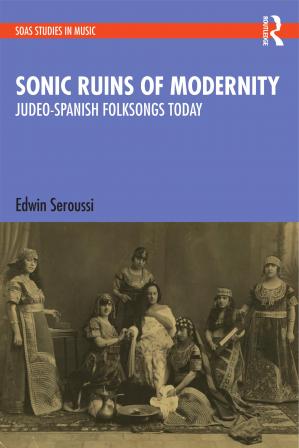Abraham Altalef (Izmir)
2. El Merecimiento de Isaac (Im Afes Rova Haqen)
Si el servicio de los sacrificios fue abandonado (If the ritual of the sacrifices was cancelled)
This copla is a translation of the akedah (piyyut on the sacrifice of Isaac) Im afes rova' ha-qen by the Ashkenazi poet Ephrayim ben Itzhak of Regensburg (c. 1110-1175). The poem opens with a description of the suspension of the sacrifices at the Temple of Jerusalem after its destruction. Despite this calamity, God can trust the faithfulness of the Jewish people as Abraham demonstrated by obeying the order to sacrifice his own son Isaac. The inclusion of an Ashkenazi poem in the Sephardic liturgy is exceptional. In the Sephardic rite it is generally sung before blowing the shofar on the second day of Rosh Hashanah. The translation into Ladino was made by Reuben Eliyahu Israel (1856-1932), a rabbi and hazzan active on the Island of Rhodes who was highly revered by our collaborators of Rhodesli and Izmirli origin. The translation was published in his book of translations of poems and prayers of the High Holydays published in Smyrna in 1910. The poem consists of quatrains of rhymed verses. The elaborate traditional Sephardic melody of this Hebrew poem is applied to other texts of the Rosh Hashanah liturgy. Given its importance and popularity, this melody has been recorded commercially at the beginning of the twentieth century by several prominent Turkish Sephardi singers such as Haim Effendi, Çakum Effendi, Isaac Algazi, y Jack Mayesh.
Text
2b. Stella Mayo-Cohen (Rodas)
Si el servicio de los sacreficios fue abandonado,
si nuestro santuario fue roinado,
el pueblo Israel no ser nunca exterminado,
por modo del patriarca Abraham el venerado.
Su devuamiento, Oh, Dio, reconocerás,
de su fedelidad siempre te acodrarás,
cuando le dijites: toma a tu hijo regalado y lo degollarás,
y su sangre sobre el altar destillarás.
Presto corrió Abraham por acontar a su hijo
que su alma con su alma era en fuerte atadijo,
aprontó la leña y el fuego, como el Dio quizo,
sin que Ishak supiera el escopo de este rijo.
Legero como el corzo, se sometió Isaac a su comando,
a su padre le dijo: - Tú ti has olvidado,
el fuego y la leña ya stamos llevando,
onde está el animal que será degollado?
Estonces su padre, por non aturbarlo,
le respondió a su hijo, por contentarlo:
- El Dio aprontará el animal por degollarlo,
nosotros debemos caminar y esperarlo.
Padre y hijo, con muncho devuamiento,
continuaron sus caminos con pureza y santificamiento,
a hacer la veluntad del Dio era sus únicos pensamientos
a verso los montes con apresuramiento.
Cuando ellos vieron de la parte de Oriente
que una nube abajaba y estacionaba en el monte,
aprontaron los leños con un amor ardiente
por hacer la veluntad del Dio Potente.
Cuando Ishak entendió que él debía ser sacrificado,
le dijo a su padre, en edad muy avanzado.
- Padre mío, átame como cordero, bien asigurado,
non seas peadoso, aunque so tu regalado.
El Dio mi escogió y me quiso merecer,
non podemos contrariar, debemos obedecer,
la fin del hombre esto debe ser,
morir, entre los vivos desparecer.
Con fuerza y coraje, obedeciendo a su Dio,
ató Avraham a su hijo que a los noventa años le nació,
y enriba de los leños lo espandió
y el fuego sobre el altar encendió.
Lo que hizo este padre hace encantar
sin denguna peadad, a su hijo y a cortar
por allegarlo sacrificio sobre el altar,
por executir el hombre de su Dio y respectar.
Cuando Avraham metía el cochillo en la garganta
una voz del cielo llamaba a voz alta:
- Avraham, Avraham, non toques al mancebo, basta,
degolla a ese animal y a Ishak desata.
Este animal seya su remplazamiento,
destinado para ésto desde su nacimiento,
ya conocí la pureza de tu sentimiento,
tu fedelidad y tu devuamiento.
La memoria de este acto seya, oh, Dio, delantre de tu silla,
padre y hijo te obedicieron con grande energía,
no olvides tu alianza con la nación judía,
oyí nuestras oraciones en este día.
Tus hijos fedeles te llaman con abatición,
este acto emportante sea su mamparación,
resgata con tus piadades a tu nación
que espera siempre tu salvación.
Bibliography
Zimbler, Albert. Rabbi Reuven Eliyahu Yisrael - the spiritual leader of the Sepharadim of Craiova, Romania, and the amazing history of his book of Hebrew poetry translated into Ladino. International Symposium on Sephardi Jews in South-Eastern Europe and Their Contribution to the Development of the Modern Society ed. Dumitru Hîncu et al. Bucharest: Federation of the Jewish Communities in Romania, 1998, 51-58.
.ישראל, ראובן אליהו. טראדוקסייון ליב'רי די לאס פואיזיאס איבראאיקאס די ראש השנה אי כפור, איזמירנה, תר"ע.






